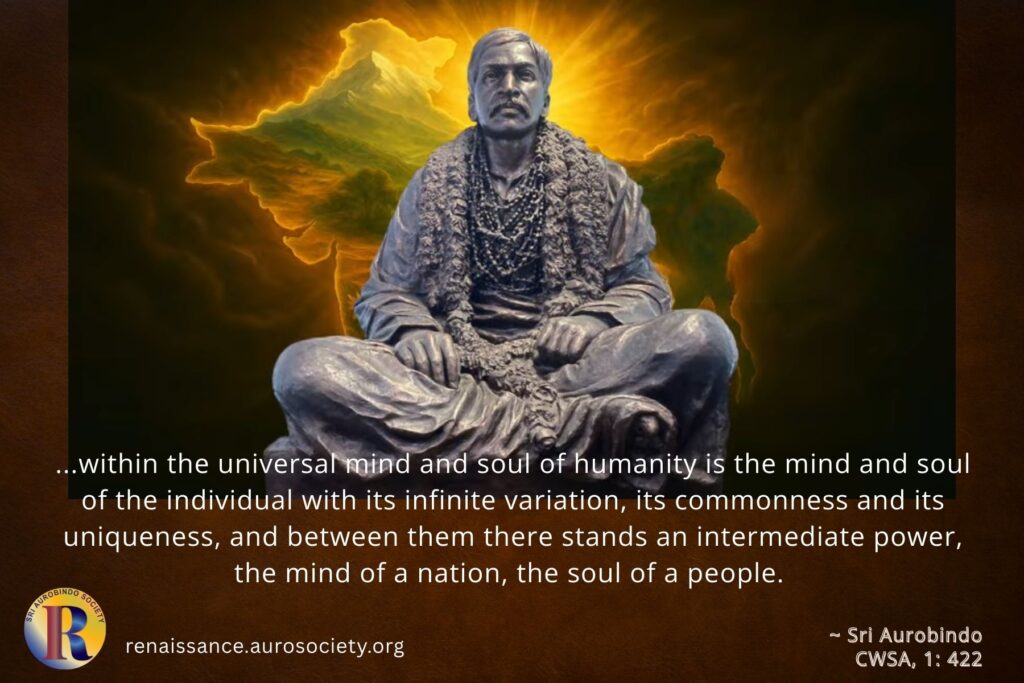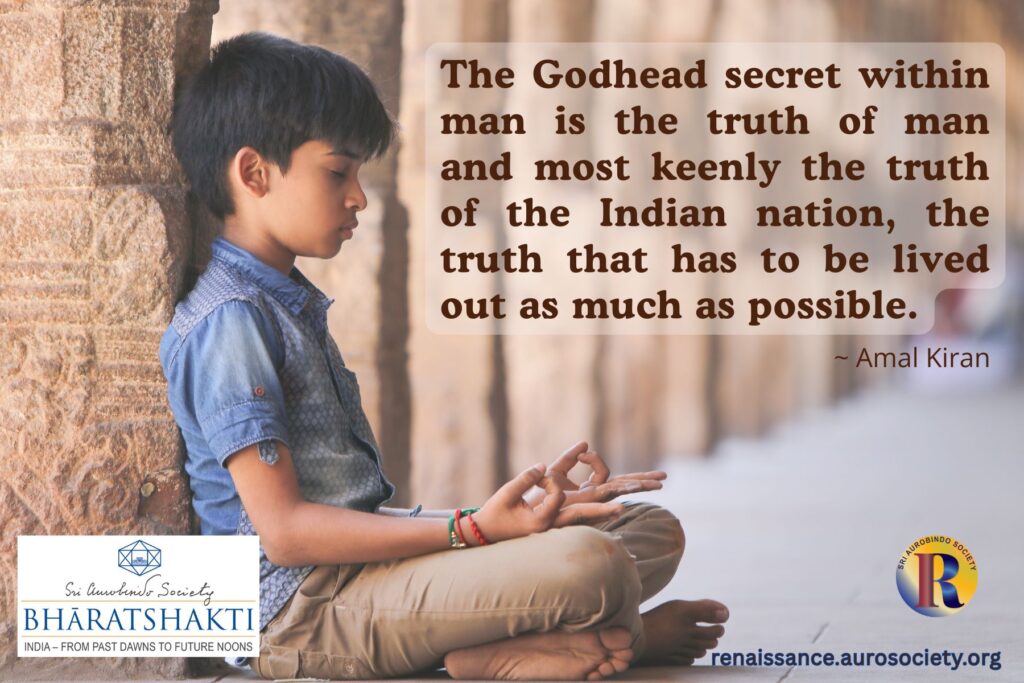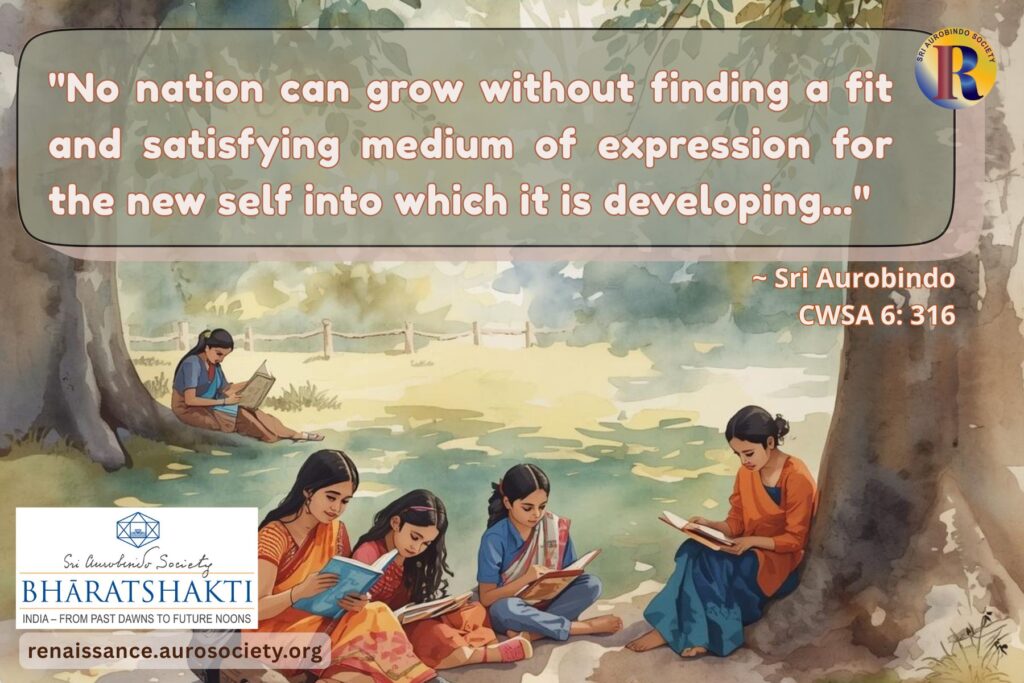Editor’s note: How is Sri Aurobindo’s ideal of spiritual nationalism which invokes the highest ideals of Sanatana Dharma different from a narrow and exclusive religious nationalism? How is this ideal significant today for India’s nation-building work? This article addresses these question especially in consideration of India’s destined work for the future of humanity and the world.

PART 1
Through the pages of Bande Mataram Sri Aurobindo reminds Indians of the Indian vision of nation and nationalism. He says that for an average Western mind the nation is merely the country. And the country constitutes a certain piece of land and a people living one life under a single governing power. “When the European wishes to feel a living emotion for his country, he personifies the land he lives in, tries to feel that a heart beats in the brute earth and worships a vague abstraction of his own intellect,” he writes.
But for an Indian mind and heart, the view of nation and nationality ought to be deeper, says Sri Aurobindo.
The ancient vision of our seers and sages must guide the Indian view of nation. This vision looked through the gross body of things and discovered a subtle body within. It further looked through that and found yet another more deeply hidden. And within the third body they discovered the “Source of life and form, seated for ever, unchanging and imperishable.” What is true of the individual is also true of universal. What is true of the man, is true also of the nation, says Sri Aurobindo.
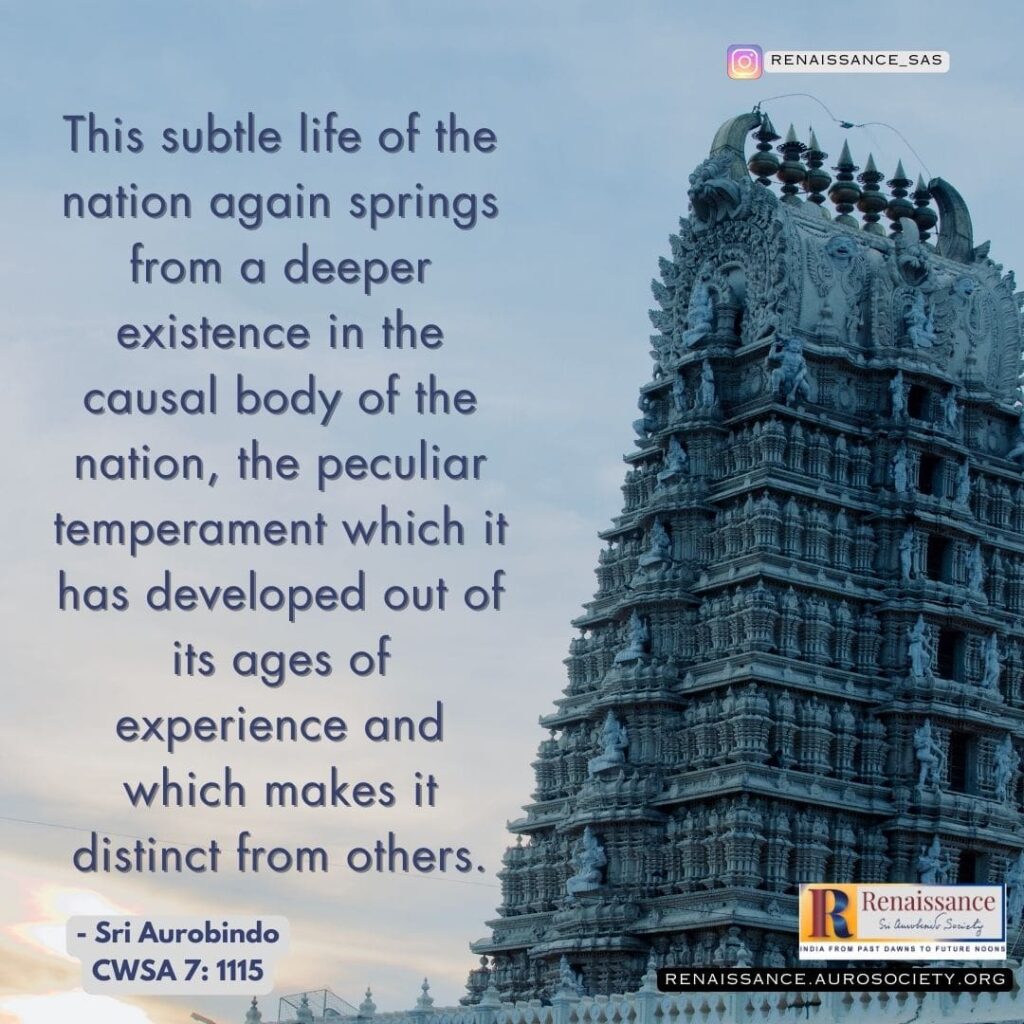
He then goes to give a most eloquent description of nation:
The country, the land is only the outward body of the nation, its annamaya kosh, or gross physical body; the mass of people, the life of millions who occupy and vivify the body of the nation with their presence, is the pranamaya kosh, the life-body of the nation. These two are the gross body, the physical manifestation of the Mother.
Within the gross body is a subtler body, the thoughts, the literature, the philosophy, the mental and emotional activities, the sum of hopes, pleasures, aspirations, fulfilments, the civilisation and culture, which make up the sukshma sharir of the nation. This is as much a part of the Mother’s life as the outward existence which is visible to the physical eyes.
This subtle life of the nation again springs from a deeper existence in the causal body of the nation, the peculiar temperament which it has developed out of its ages of experience and which makes it distinct from others.
These three are the bodies of the Mother, but within them all is the Source of her life, immortal and unchanging, of which every nation is merely one manifestation, the universal Narayan, One in the Many of whom we are all the children.
~ CWSA, Vol. 7, pp. 1115-1116
ALSO READ:
Sri Aurobindo on Indian Nationalism and Yoga
The above description makes it clear that a nation is not merely the separate life of the people in the country. A nation also means a separate culture and civilisation. And furthermore, there is also a peculiar national temperament which has become too deeply rooted to be altered. This educational enterprise to awaken the Indian masses, particularly the youth was important during the Indian freedom movement. But perhaps today it has become even more relevant.
We live now in fast globalizing times and the young minds are grappling with the idea of nation and nationalism. The dominant discourse today still comes from the West. The West’s long and bloody history of wars in the name of national supremacy and national ideologies has naturally coloured its intellectual thought. No wonder, the intellectual elite of the West sees the idea of nation as exclusionary and nationalism as chauvinism. Nation, in this view, is almost exclusively a mere political entity, with its interests often in conflict with other nations.
In Sri Aurobindo’s vision, the modern and free Indian nation was never meant to be a colonial copy with an outer machinery of elaborate bureaucratic structures left over by the British and now-merely-to-be-filled by the Indians. Though of course, he recognised the necessity for an effective external organisation.
He envisioned the rebirth of a nation which is not new but an ancient one and with a unique civilizational spirit.
Its new forms would express India’s unique temperament, one shaped by her spiritual genius. Such a new India would be conscious of her true mission. While united in spirit, it would be richly diverse in forms. It will be eternal yet newly evolving. While being true to her timeless spirit, it will yet be inclusive and integrative of all that continues to come from the world outside.
Spiritual Aim of Indian Nationalism
Nationalism for Sri Aurobindo had a spiritual aim. It is to recover Indian thought, Indian character, Indian perceptions, Indian energy, Indian greatness. Only through such a recovery of our innate genius, we shall become capable of working toward solving the world problems in an Indian spirit and from the Indian standpoint. He cautioned that an exclusive preoccupation with politics and economics could dwarf a nation’s true and integral growth. It could prevent the flowering of originality and energy.
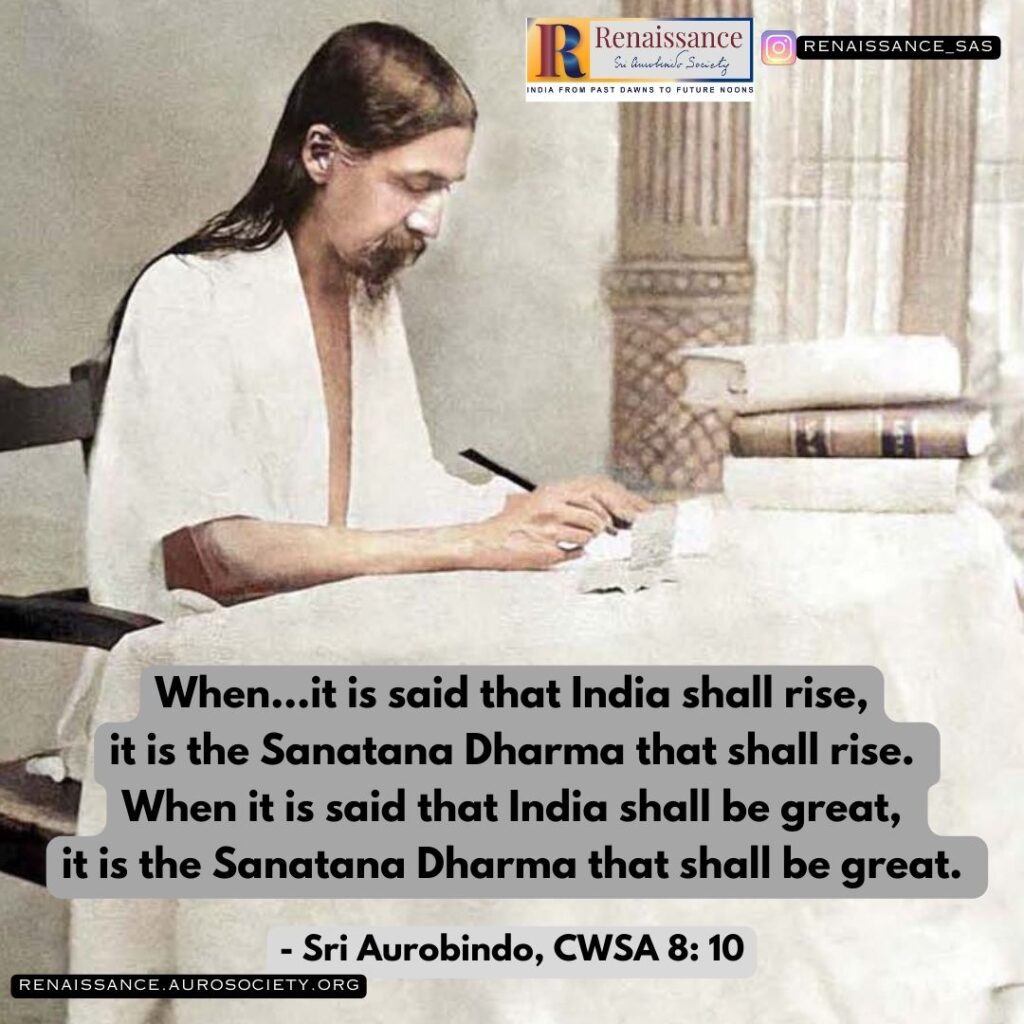
Sri Aurobindo duly recognises the significance of the outer socio-political and economic development of a nation. At the same time, he reminds us to “return to the fountainheads of our ancient religion, philosophy, art and literature and pour the revivifying influences of our immemorial Aryan spirit and ideals into our political and economic development.” (CWSA, Vol, 8, p. 245)
In his Uttarpara speech after acquittal from Alipore jail, Sri Aurobindo reminded his fellow countrymen of the work that India must do for humanity.
When…it is said that India shall rise, it is the Sanatana Dharma that shall rise. When it is said that India shall be great, it is the Sanatana Dharma that shall be great. When it is said that India shall expand and extend herself, it is the Sanatana Dharma that shall expand and extend itself over the world. It is for the dharma and by the dharma that India exists.
~ CWSA, Vol. 8, p. 10
He also clearly explained the meaning of the Sanatana Dharma, the eternal dharma. Only that religion which embraces all others, which embraces in its compass all the possible means by which one can approach the Divine, can be truly universal, truly eternal. A narrow, exclusive or a sectarian religion can only live for a limited time and a limited purpose.
Watch:
Dharma, not Same as Religion
During his revolutionary period, Sri Aurobindo spoke of spiritual nationalism. What did he mean by that? How is it different from a narrow and exclusive religious nationalism? And what is its relevance for today’s and tomorrow’s India? For this, it is important to reflect on the fundamental difference between dharma and religion.
Dharma is a uniquely Indian idea. One can not translate it merely as duty, religion, code of conduct, ethical rule, or moral law. It is none of these and yet may have something of these.
Dharma transcends all these limiting and limited terms and yet includes some things from each of these. It is individual and universal at the same time. It is fixed and yet evolves; eternal and yet gradually progressive. Dharma is of a person, and cosmic at the same time. It is an inner guide, which must be discovered individually. And yet it must be a part of the larger dharma of the group, the nation, humanity to which one belongs.
Dharma is often mistranslated as religion.
The notion of ‘religion’ as understood by the Western intellectual tradition has been falsely confounded with the much wider, liberal and expansive Indian term ‘dharma.’ This has resulted in a great deal of socio-political-cultural conflict. Chaturvedi Badrinath, in his book titled Dharma, India and the World Order: Twenty-One Essays writes:
There has been no misunderstanding more serious in nature than the supposition that Indian culture was fundamentally ‘religious’, in the sense in which the words ‘religion’ and ‘religious’ have been used in the West for centuries.
These imply a belief in God as the creator of the universe, a central revelation of God, a messenger of that revelation, a central book containing the life and the sayings of that messenger of God, a central code of commandments, a corpus of ecclesiastical laws to regulate opinions and behaviour in the light of these, and a hierarchy of priesthood to supervise that regulation and control. These are the common, though in their specific contents very different, elements of what are described as the historical religions of the world.
Dharma, the universal foundation upon which all life is based, is immeasurably more than ‘religion’; mistakenly one has been taken to be the other. It is to this confusion that we can trace most of the Western misconceptions of Indian culture. Since a great many of our political and legal institutions continue to be founded upon those misconceptions; hence most of the social and political problems that the people of India face today.
~ Bardinath, C. (1993), Dharma, India and the World-Order: Twenty-one Essays. Deutschland & Scotland: Pahl-Rugenstein and Saint Andrew Press, p. 39
***
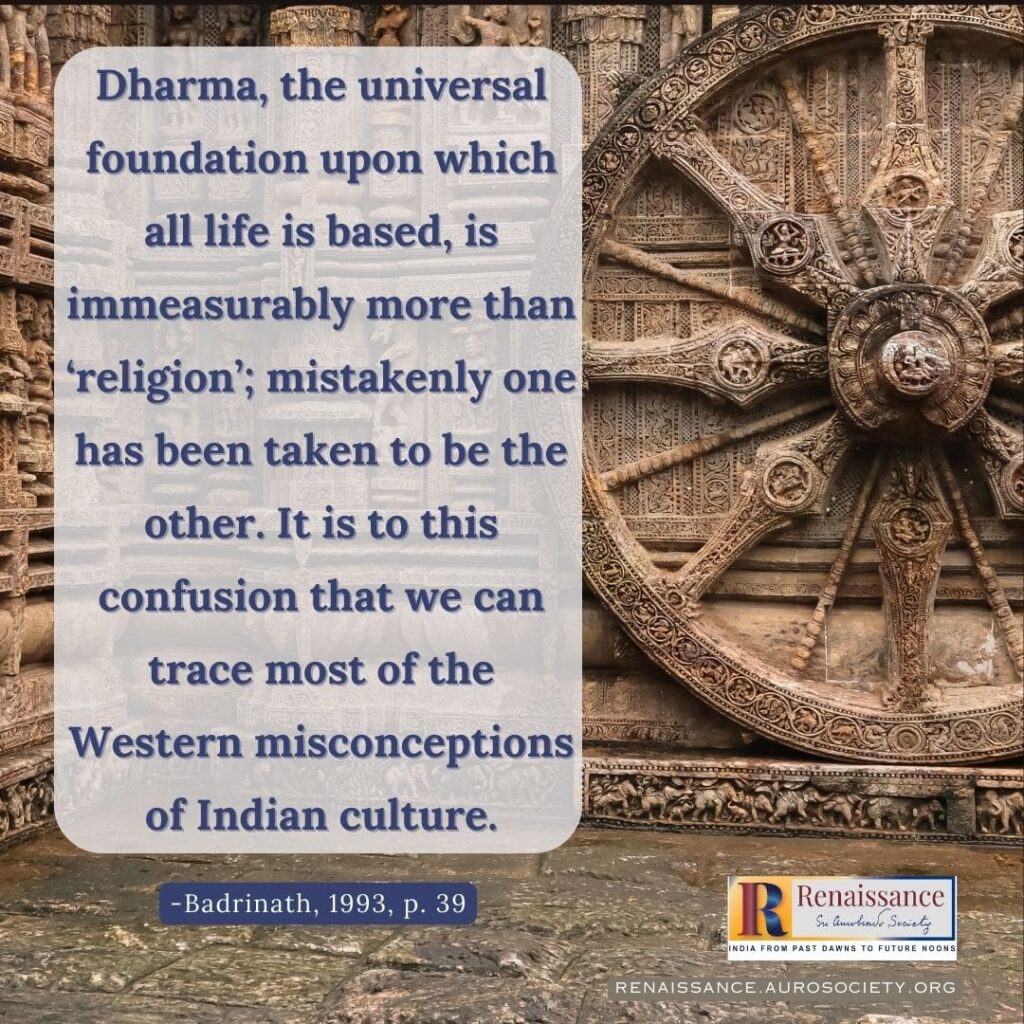
Sri Aurobindo explains that dharma essentially is the foundation of life, only next to the spirit. If the Infinite or seeking for the Infinite is the major chord of the Indian culture, the idea of the dharma, according to him, is only second to it.
Our ancient seers and sages had a clear insight into the infinitely diverse and complex human nature. This nature comes into play as human beings pursue the different goals of life through different stages or phases of life. In order to sustain and hold together such diverse complexity, they came up with the ideal of dharma.
The concept of dharma covered basically all natures, all aspects of life, all situations and stages of life. And at the same time it allowed for maximum freedom, continuity and greatest possibility of contextualization, adaptation and adjustment.
Sri Aurobindo in his Essays on the Gita defined Dharma as follows:
Dharma in the Indian conception is not merely the good, the right, morality and justice, ethics; it is the whole government of all the relations of man with other beings, with Nature, with God, considered from the point of view of a divine principle working itself out in forms and laws of action, forms of the inner and the outer life, orderings of relations of every kind in the world.
Dharma is both that which we hold to and that which holds together our inner and outer activities. In its primary sense it means a fundamental law of our nature which secretly conditions all our activities, and in this sense each being, type, species, individual, group has its own dharma.
Secondly, there is the divine nature which has to develop and manifest in us, and in this sense dharma is the law of the inner workings by which that grows in our being. Thirdly, there is the law by which we govern our outgoing thought and action and our relations with each other so as to help best both our own growth and that of the human race towards the divine ideal.
~ CWSA, Vol. 19, pp. 171-172
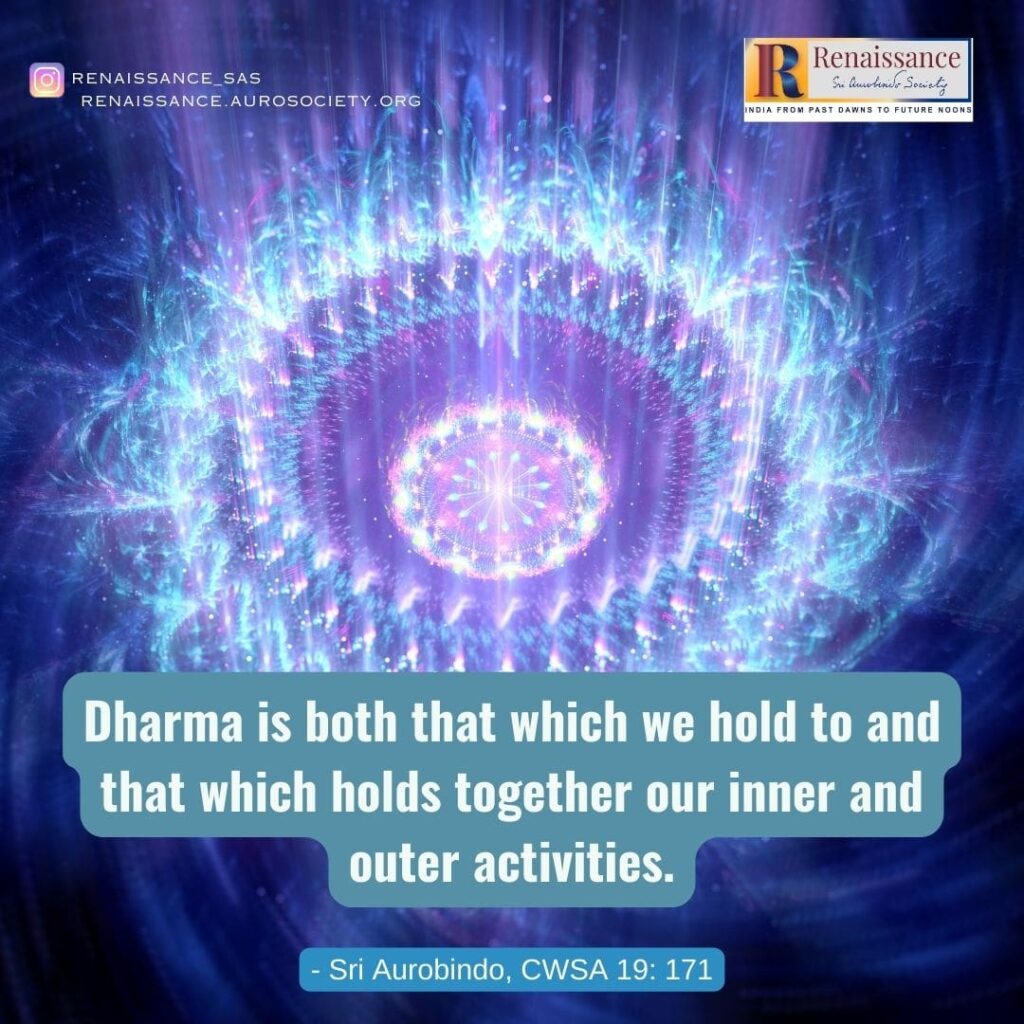
Continued in PART 2

~ Design: Satya & Beloo
~ Video edit: Satya

